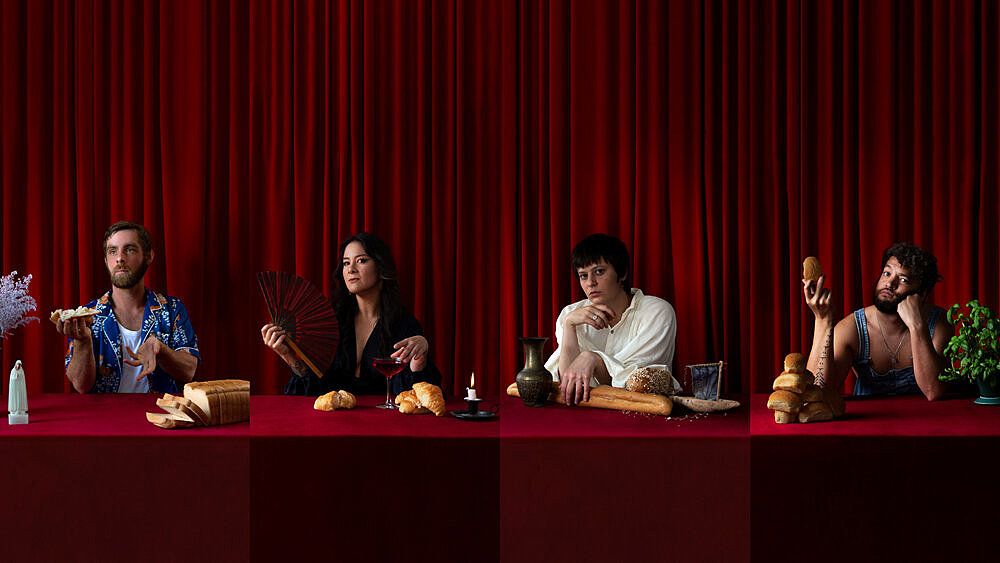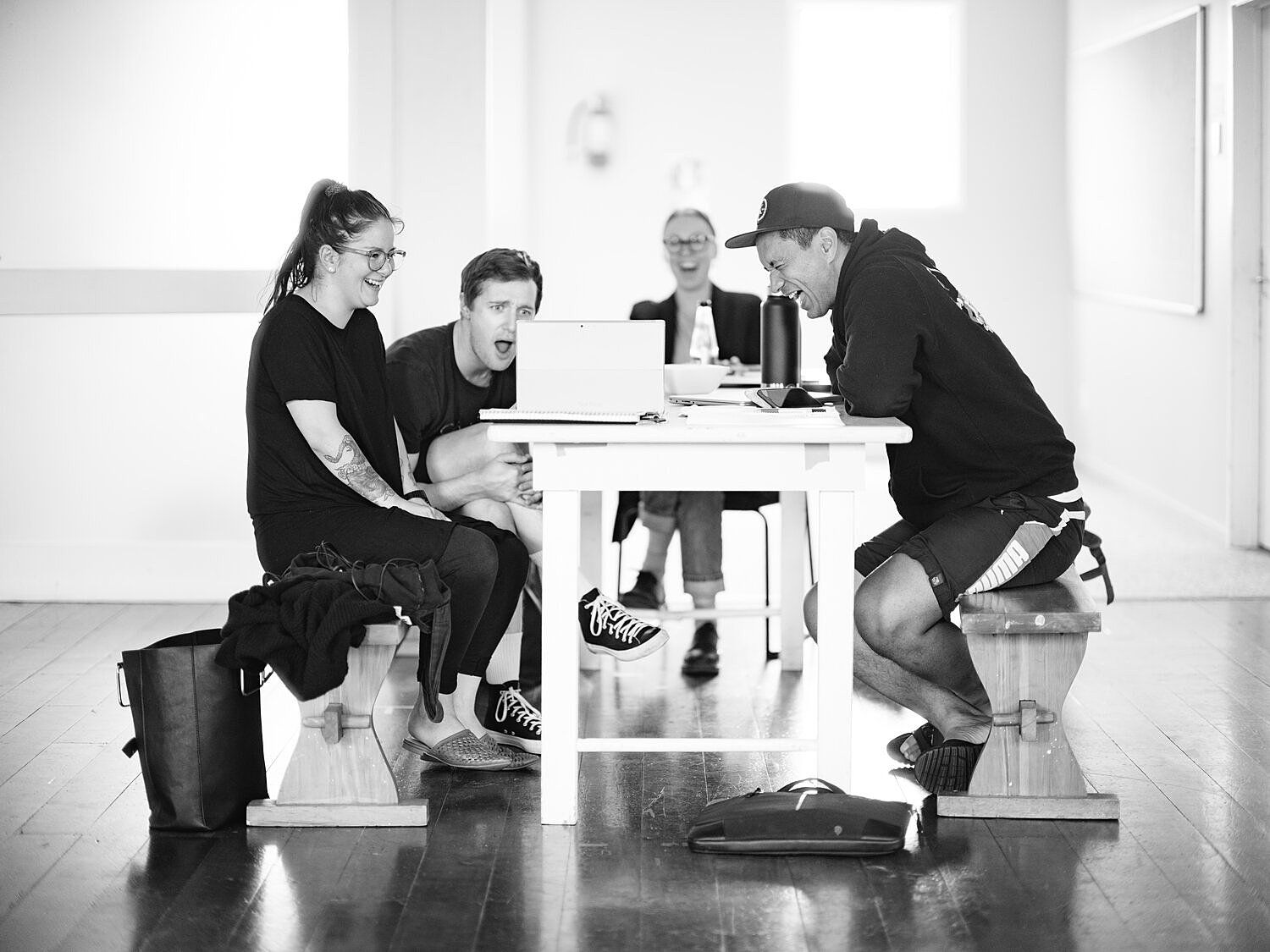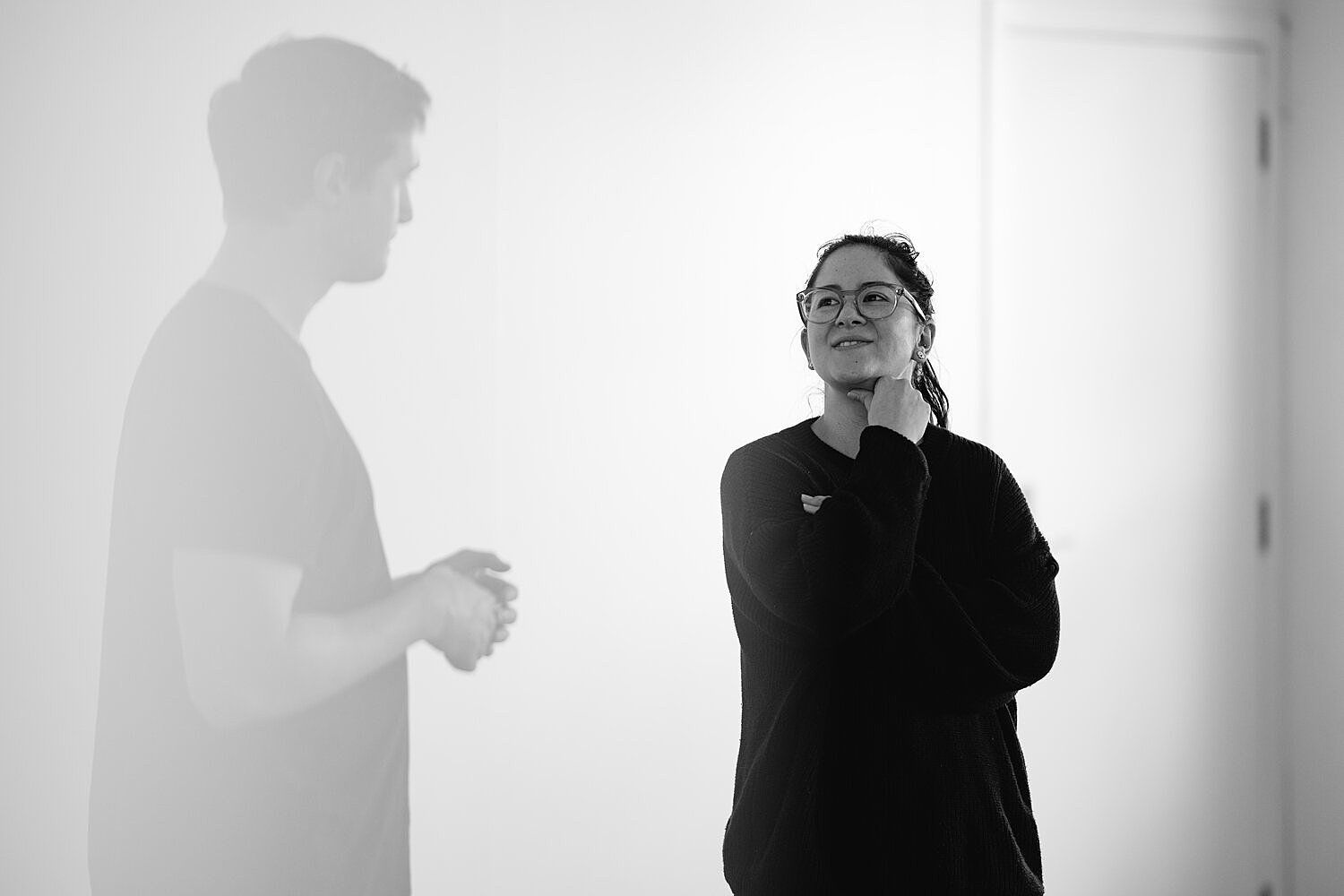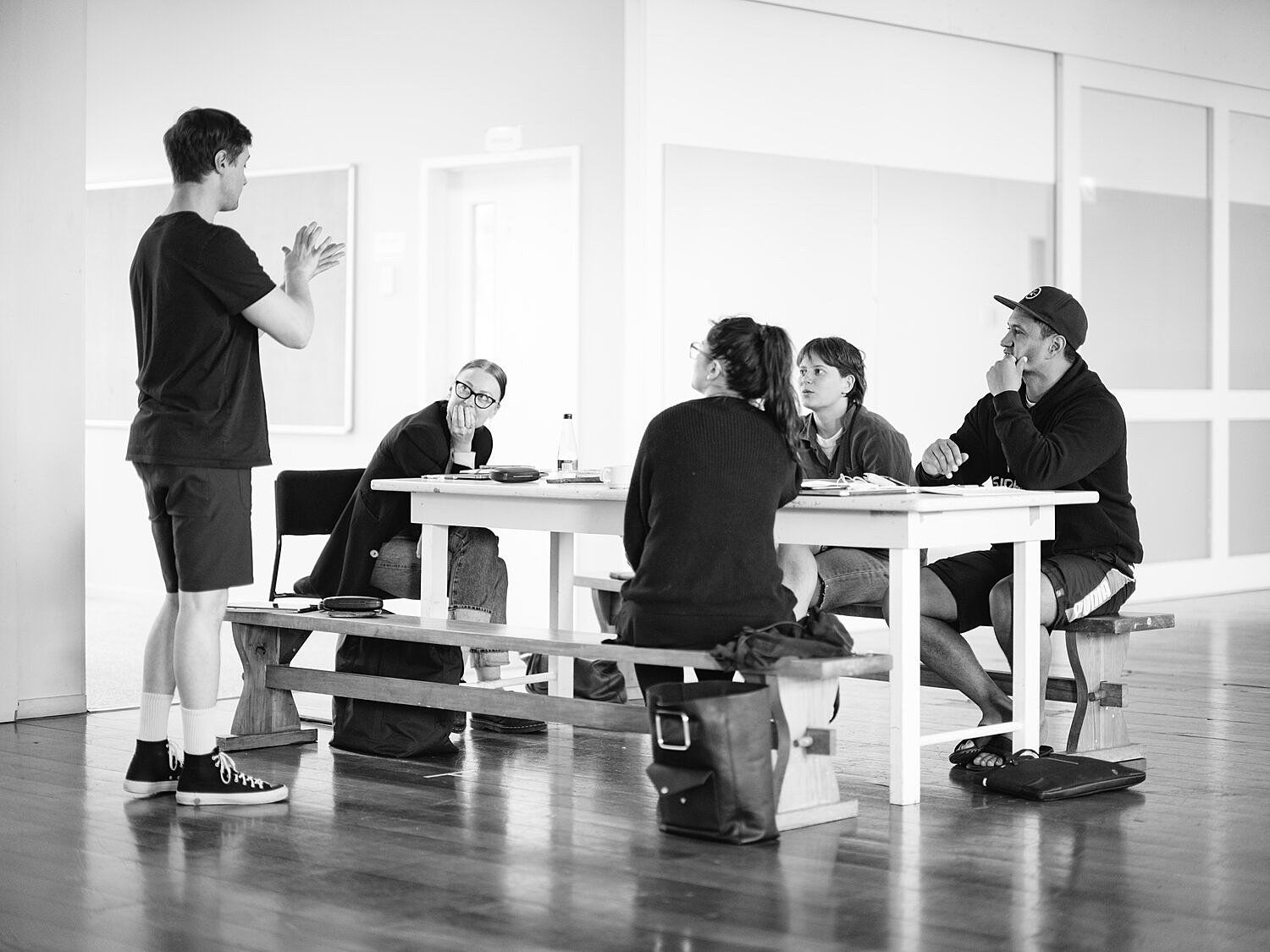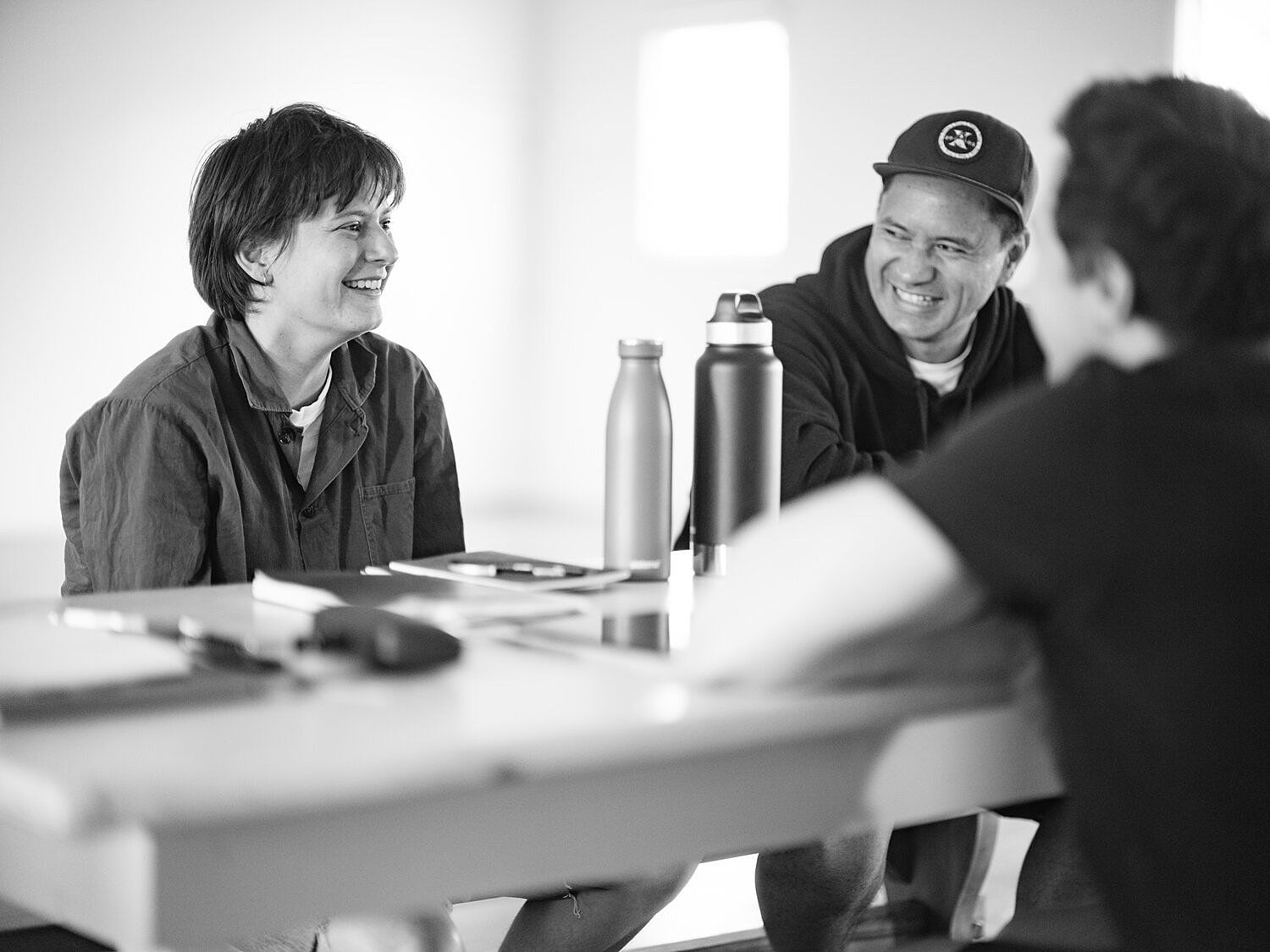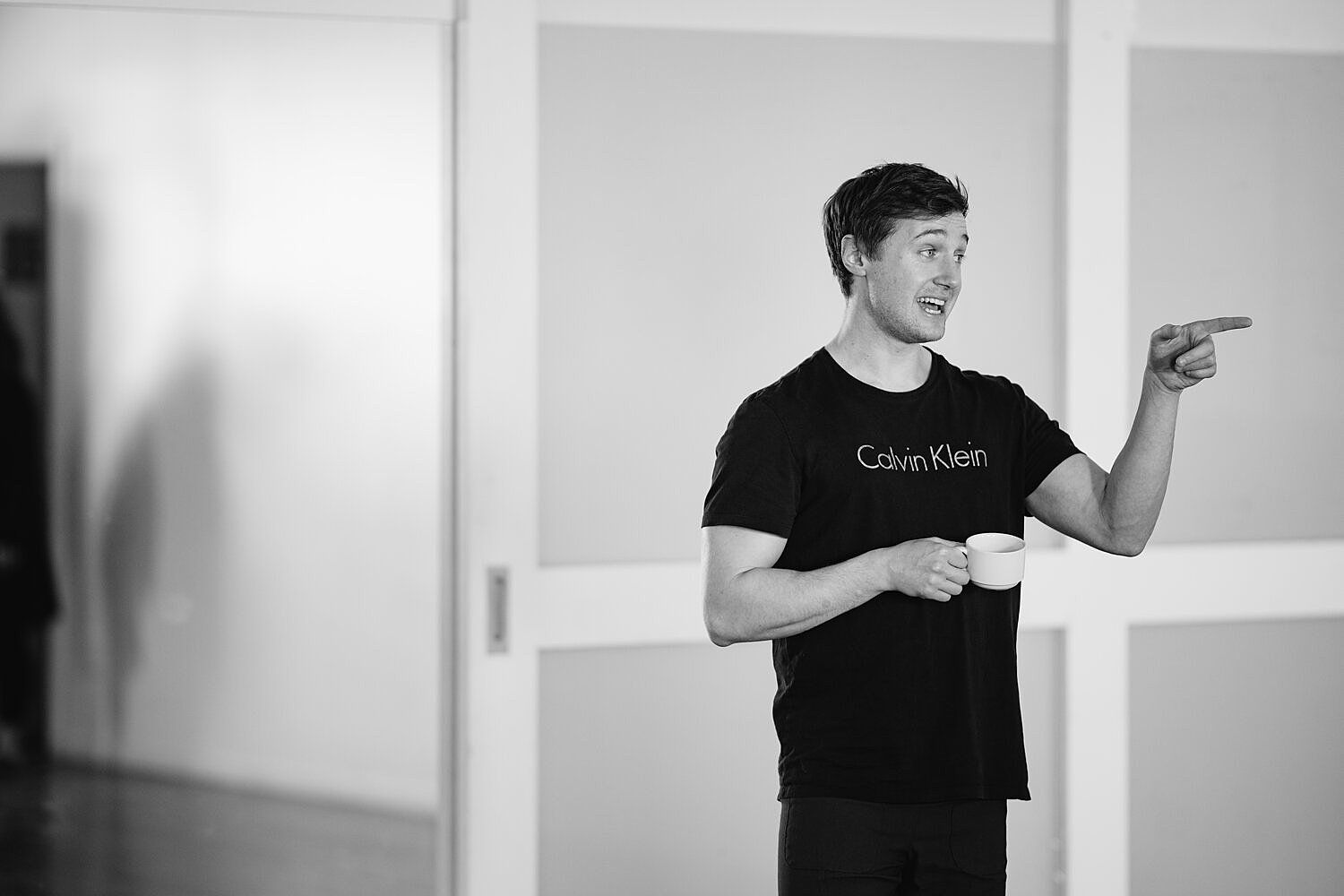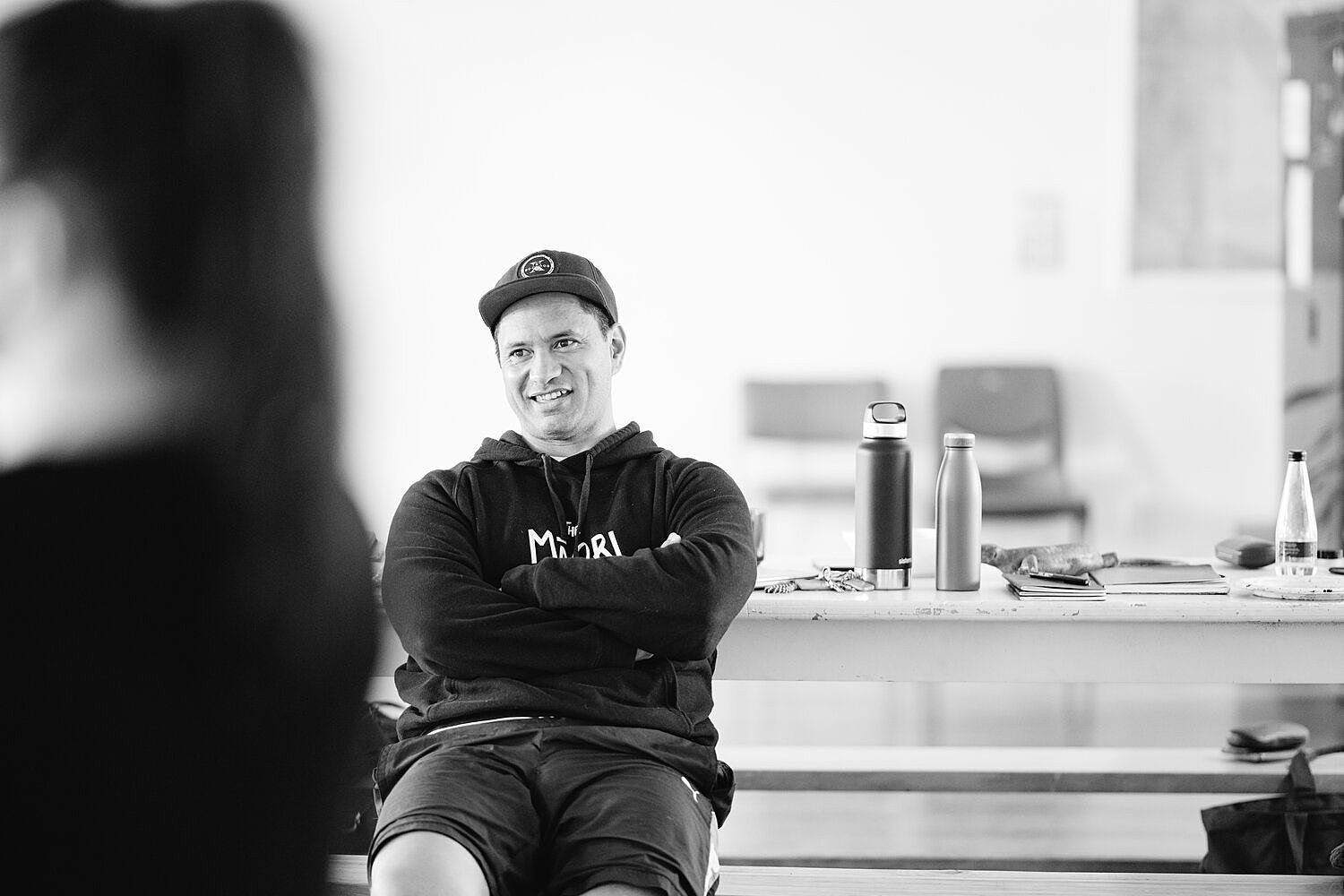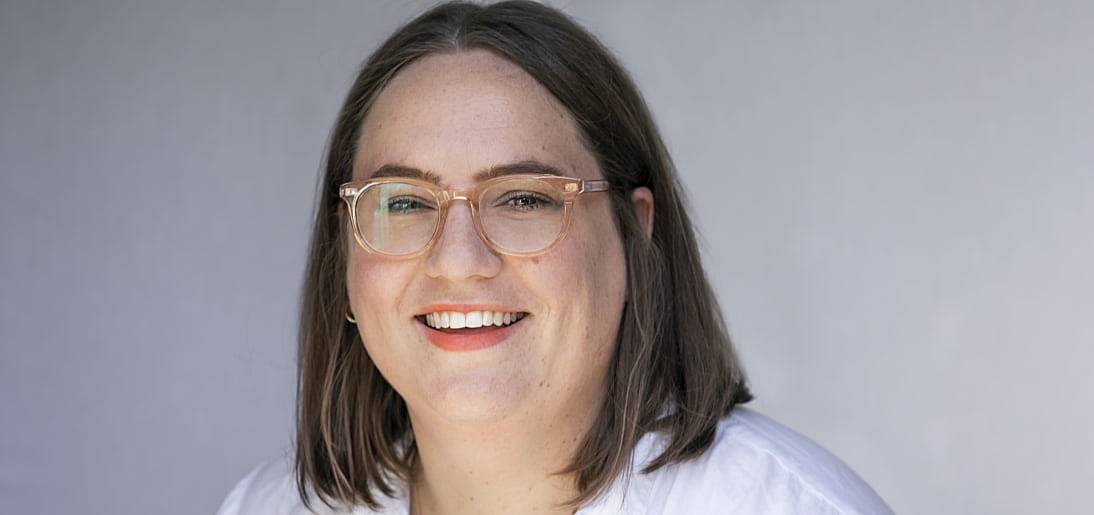Not Another Zoom Call: A Roundtable with the Makers of Break Bread
Alice Snedden takes a behind-the-scenes look at Silo Theatre’s cheeky and triumphant newest work, Break Bread, in a roundtable with Sophie Roberts, Alice Canton, Freya Finch and Leon Wadham.
This coming Tuesday, 30 November, Break Bread will be broadcast to audiences. The theatre work has had a baking process spanning years, lockdowns and multiple crises. In this roundtable discussion, writer, actress and comedian Alice Snedden asks Silo Artistic Director Sophie Roberts and makers Alice Canton, Freya Finch and Leon Wadham how they continued to ‘make bread’, and in doing so gets to the sourdough bug of their provocation – practice – and, of course, Zoom etiquette in making this ambitious and anticipated production.
You can watch the video recording of the roundtable, or read the transcribed written version below. Tickets to the show are available now on the Silo website.
Alice Snedden: Welcome everybody to the Break Bread roundtable. Thank you for being here, not at my behest but at the behest of Silo Theatre and The Pantograph Punch. I'm Alice Snedden and I’m the host. I thought the way to start is for everyone to introduce themselves and their roles in this production.
Sophie Roberts: I'm Sophie Roberts, the director of Break Bread and one of the dramaturgs. I'm also the Artistic Director for Silo, the company that has made this work.
Alice Canton: Kia ora everyone. I'm Alice Canton, one of the creators of this work, and I also have the pleasure of performing in the work as well.
Freya Finch: I am also one of the creators of this work. And I also get the pleasure of performing in this work.
Leon Wadham: I am another creator and a dramaturg along with Sophie.
Leon, is it true that this show has been in the making for a lifetime – or, more accurately, two years?
AS: Leon, do you have the pleasure of performing in this project?
LW: I do not have the pleasure of performing in this project. But there are other pleasures to be had.
FF: He didn’t make the cut.
[Leon leaves]
AC: Leon, come back! We didn’t mean it!
AS: He’s in the house – I could go get him. So sorry, guys.
[Leon returns]
LW: Sorry. I just had a moment.
AS: Next time have it on camera. That’s where we really like to capture those things.
So, I’m going to be upfront, I know all of you personally to varying degrees. I know Leon, I would describe it as intimately. Although we are not in an intimate relationship.
LW: Right now.
AS: Yeah right now, I mean there is always a chance. Leon, is it true that this show has been in the making for a lifetime – or, more accurately, two years?
*
LW: Sophie came to us at the end of 2019 with Silo. The plan was to do a big community show at the end of 2020, where everyone got together in the same space and shared stories, made food together, maybe fed each other across the table. Quite shortly afterwards, we went into a global pandemic. And the concept of kneading dough with a stranger and putting your fingers in their mouth didn't quite make sense in the new context.
Over the last two years, we've been sort of wrestling with the new world we're in, but with the same desire for community. And the product we've ended up with, I think, has the intention of the first idea that Sophie came to us with, but in a completely new form.
AS: Was it quite hard to maintain it? Like I find any artistic and creative project to be so fulfilling at the end, but utterly tiresome and really hard work during the process to maintain motivation and the initial spark. How do you sustain that spark over two years of a show being pushed and changed?
FF: I think it’s helped that the show and the world around us had changed so much. We've had to be in constant response to that. There are probably 40 versions of the show we could have done. Right? Although we're the same or a similar team, and we've worked on this thing through time, it's like we've made several different shows that have similar threads that have carried through. It's been such an evolution. That's helped keep it fresh.
Are thereversions of the show that you worked towards and had to be like, okay, we're throwing that away and starting again from scratch
AS: Are thereversions of the show that you worked towards and had to be like, okay, we're throwing that away and starting again from scratch.
SR: We were ready to go with a live version, and had to completely throw that out and start over.
AS: Oh, my God, I didn't realise you’d gone that far. That is... wow, that is tough stuff.
FF: Our last workshop on the live show, we really thought we'd cracked it. We'd had a couple of tough months of workshops that were good but a little bit ropey, and we were like, what's the essence of what we are doing? And then in the last workshop, we were like, we've cracked it! We’ve cracked it. Then we went into Delta lockdown.
AS: Oh god, I love a Delta lockdown. It's my favourite lockdown, right after the initial lockdown, that we’ll all remember for the rest of our lives.
LW: That's so crazy, because I feel like you've cried so much this week.
I did, very much so. I was sourdough-ing on the daily
AS: That’s true. Delta lockdown consists of me eating a lot of bacon and crying all the time. So hold on, there’s the bread thing that was obviously in the show pre-Covid-19. Then when lockdown hit, breadmaking also happened to take off as a concept.
AC: Yeah, we really caught the zeitgeist on that one. We really couldn't have asked for a better alignment between the show and people's meaningless lives. It’s just great for us [laughs].
FF: The concept wrote itself for a few months there.
AS: Did any of you dive into the lockdown hole of making bread?
SR: I did, very much so. I was sourdough-ing on the daily.
AS: That's incredible. Did you start off with the kombucha thing? What is it? The sourdough starter?
SR: Yeah, I made a starter. I went all in on the bread in the first lockdown.
AS: And then the second lockdown was more kind of like...
SR: Yeah the passion tapered off.
FF: Now you make digital ‘breads’.
I have a question for you. In the first live devised show you all created characters. Are they based on yourselves or versions of yourselves?
AS: I have a question for you. In the first live devised show you all created characters. Are they based on yourselves or versions of yourselves? Or would you prefer not to say, for fear of legal action?
FF: They are, but I feel like that's grown stronger in this iteration of the work. In the live work, we were leaning quite heavily into a clown space. I mean, this work is still very clowny in lots of different ways. But I feel like we've leaned quite heavily into playing an exaggerated version of ourselves in this iteration.
AS: Was the version of yourselves in lockdown dramatically different from the version out of lockdown? I guess I'm asking how much mental degradation has everybody faced?
AC: [Laughs] I mean, I sort of can't get away from making shows in which somehow I've like, narcissistically, written myself into it. I just can't imagine writing a protagonist that’s basically not Alice. But then the other thing is, whenever I do shows and people are like wow, so brave, #authentic. I'm like, Oh, God, that’s not me. No, no, no, that's like a version that's very far away. It's only dawning on me literally now as I'm saying this that people are going to watch the show and think I’m my character.
AS: Are you worried about that?
AC: Talking about legal action, maybe I need to really consider my options.
AS: You need to change your character's name from Alice to Balice or something.
AC: Balice Manton?
AS: Plausible deniability.
*
LW: The thing about making this over the two years is we always thought we were aiming for a live event, even with the disruptions and the rescheduling and Zoom sessions, while bracing ourselves for the next interruption. The anxiety of the world stopping and knowing it could stop again was kind of unavoidable.
So when Sophie said, “Listen, we're going to make it as though it's Alert Level 4, and if we're in Level 4, great, and if we're not, we're still doing it like this”, that was incredibly freeing. I feel this has ended up being my favourite version of the show because everything we were suppressing became part of the text. It was no longer like something we were trying to hide away. It was, in fact, the show.
I'm really excited about this version of the show, where the performers and characters are in the same predicament and the same circumstances as the audience. Like, I felt really good about trying to create a community experience stuck in my home, rather than getting an exemption and coming together with my friends in a special space. I want to try and achieve this goal under the same restrictions everybody else is working under.
AS: What was your starting point for that? Were there any pre-existing texts so you could go, okay I see what they did there? Online theatrical performances are quite new – what did you draw on?
The other thing that makes it inherently theatrical is how stacked the scenes are in terms of layering of references
SR: We had a lot of references from the last year or 18 months of digital work, mostly from overseas. Right at the start of this rewrite process, we sat down and I guess created a bit of an artistic contract with each other. What do we definitely not want to do? What do we want to try and achieve? We were really clear on it feeling like a piece of theatre. We weren't interested in being shitty filmmakers, that wasn’t a path we wanted to go down. We wanted it to truly be a piece of theatre, and that informed all of the decision making and the form. We had references, but kept coming back to our collective agreement on what we wanted to achieve artistically.
AS: I feel like this is a stupid question, but I'm so narrow in my consumption of art. I'm like, this is a movie, this is a TV show. When I go out, it's the theatre. If there's only one person, it's comedy, unless there are lots of people, and it's improvisation. What is the connective tissue between a theatre experience where you go and sit in a theatre instead of sitting at home watching it?
SR: What I think makes it a piece of theatre, as opposed to a short film, is the use of theatrical conventions the whole way through for all of our problem solving. There aren't lots of cuts, there are seven-minute sustained scenes, the way they would be on stage, and everything has to be solved on camera. So we're not employing naturalism, really, at any time. We’re tipping into, or nudging our way into, Absurdism, and the clowning that existed from previous shows as well. I feel that all makes it theatrical.
AS: So there’s not a lot of CGI.
SR: There’s no CGI. The vibe is very much Mum I built a fort in the living room, come and have a look, you know? That childhood delight sort of storytelling. The other thing that makes it inherently theatrical is how stacked the scenes are in terms of layering of references. This feels inherently theatrical to me – it's quite dense, actually. There are lots of little references going on that you may or may not pick up.
*
AS: I’ve read half thescript, and the reason, I admit, I’ve read half the script is that I was really enjoying it and didn’t want to spoil any of the treats to come. I'd rather just watch it. But what I loved about it is that you're playing with global crises. Do you think that would be fair to say?
SR: Global and personal.
AS: [Laughs] Yeah exactly.I don't know how much of the content you're wanting to divulge or talk about, in fact we can entirely pivot away from this, but how did you land on the global crises that you picked?
FF: Some have been around for quite a while. They began when we went deep into history and historical tales to find examples of somewhat obvious, but unlikely, places that bread played a significant role. Then when the pandemic hit and the show became a response to that, we looked at what bread had to do with those stories, and how they were also disastrous.
AS: Was that inspired by the pandemic? Or there from the beginning?
FF: The dots joined once we connected bread with communities throughout history and Covid-19.
SR: It was a way to talk about our current situation without talking about our current situation. By looking way back at all these examples of how humans have triumphed, or not, against disasters throughout history, and asking ourselves how that changes the way we feel about the moment we're in.
You've got this cast showing you all these other disasters where people have found triumph against adversity
AS: Did it make anyone more hopeful? Like, when I was reading it, I was like, in the span of the existence of human beings, they've been through a lot of shit. Did it make anyone feel like this is fine? Or could you still feel sorry for yourself? [Laughs]
LW: I think we’re capable of both. You've got this cast showing you all these other disasters where people have found triumph against adversity or overcome an insurmountable obstacle. Very much the people telling you these stories are looking at positive examples. But they're also looking as far as they can from New Zealand and their personal, immediate circumstances. So I think the aim is escapism, but also acknowledging that you can never escape yourself.
AS: I find it really interesting that we as New Zealanders had our experience of Covid-19 18 months after the rest of the world. Do you think that gives us a unique perspective on it? Because, for me, when we were in our first lockdown, I had this real sense of global solidarity for what was going on. And then a little bit of shame about how well we’d done it. And also like, not national pride, more personal individual pride, like I’d pulled it off. [Laughs] Now, I just have envy and disgust. I wonder if that’s shared by other people.
AC: [Laughs] Yes, Alice. The operative word there is yes.
As we're making this show, we are on the precipice of shit majorly hitting the fan
AS: Do you think that changes your perspectives on this? Some people have tackled Covid-19 in artistic works, but do you think there's something unique about the way that we can talk about that?
SR: In the current moment in time that we’re making this show, we are on the precipice of shit majorly hitting the fan. So it still feels safe to laugh about our current predicament. If we were in a situation where we were looking at mass death, that’d be different. I do think the temperature of the show is the moment we're in now. It feels like we're teetering on something.
AS: When does it come out? Is it going to come out just in the nick of time?
SR: I hope so. Otherwise, it’ll feel very tone deaf.
AS: It’s such a strange time to be in, that you feel like this train is coming towards you. And you can't do anything about it and you have no sense of how fast or how slow that train is going. But it’s inevitable in its arrival.
SR: Although all of the given circumstances for the characters [are] that they're stuck in their houses while making this show, we never actually say the word Covid-19 or lockdown. One of my colleagues at Silo mentioned that this could actually be taking place at the height of the climate emergency, or any moment where our lives are challenged in some way en masse. So although it's very specific to now, we never name it to give ourselves a bit of freedom.
It is an interesting challenge for creators to maintain. Anything you make is a reflection of the world around you
*
AS: Was that one of your rules going into it? We're not gonna say Covid-19, or C-19 as I love to hear it called.
AC: I’d almost say if there was a rule – limitations are liberating – thatany time we were exploring these collective moments of crisis, the crises were never explicitly referenced. I mean, it could also be an inability to explicitly name the obstacle. There could be some collective denial going on. But, you know, like, I think that’s sort of the game of it as well, the fun, and I think that ambiguity creates play because it's like, are we talking about Covid-19? Are we talking about the mass genocide of a group of persecuted people? Are we talking about having to go to a dinner party and you've brought the wrong side salad? It's the expanding, the contracting and the stakes of that moment that I think are a part of the fun. Or maybe we're just too scared to say the C-word. I don't know.
AS: It is an interesting challenge for creators to maintain. Anything you make is a reflection of the world around you. For so many people, the world around you is for the first time, at least in our lifetimes, really similar. Everyone's home, everyone's in their bedroom. It's something that everyone is coming up against. How do we tackle this in a way that's not going to feel like a Trump joke where like, at the time it’s funny, but then you look back on it and you're like, ugh tacky?
The technical requirements of making a show like this are different, I presume, to the skill set of putting on a show in live theatre. How did you feel about diving into that side of it, especially the performance aspect? Are you kind of on your own, in terms of setting up the technical?
Yeah, sorry Leon. Honestly, Leon, you can leave and call back in when you're ready.
LW: Sweet.
[Leon leaves]
AC: Leon, don’t go – Leon! Leon come back.
AS: He’s so sensitive. And I think it’s just this week, something is going on.
LW: I can still hear you. I'm wearing my AirPods.
[Leon returns]
AS: Oh, okay. Sorry.
What was that like? Was it daunting?
I laugh every day for seven-and-a-half hours a day on Zoom
FF: It's a whole other thing to juggle. Even practising and performing to no one. because we can't be in the same space. So it's all those little things where you're like, sweet, I've got my lines down, I'm really used to playing it like this because we're on Zoom all day rehearsing. Then as soon as it's like, okay, turn the Zoom off, because, you can't be staring at each other all the time, you've got to do some acting as if you're on a stage with people, it can lose its way a bit. That whole technical side can be daunting, but we've got people helping us with that. It's more performing in this way, trying to commit as an actor in your bedroom as if you were on stage.
AS: How do you gauge that then?
AC: It's hard, but I guess the delight in it is genuinely feeling lit up by the performances of the other people on the Zoom – even if it's a sonic cue – to hear someone find a new rhythm in a line or an emotional depth, or everyone's cracking up. It's delightful and it takes you by surprise because you're not expecting to genuinely have that. In our rehearsals, I'm like crying and cracking up all the time, which is just such a delight. So as much as it's really, technically kind of like doing … this constantly, there are enough sparks that you would find in a typical rehearsal room to carry your spirits through. Maybe those are the days I feel optimistic but, yeah, I laugh every day for seven-and-a-half hours a day on Zoom.
AS: That sounds exhausting.
AC: I’m tired Alice, I’m tired.
One thing that really struck me, living in the same house as Leon as he was making the show, is how long the Zooms were and how intense they seemed
AS: One thing that really struck me, living in the same house as Leon as he was making the show, is how long the Zooms were and how intense they seemed. Well, Leon's a very intense presence generally, but [laughs].
[Leon leaves]
AC: Leon, Leon.
AS: Come back, Leon.
LW: That one was just a joke, I'm chill.
AS: I feel like it must take so much. When you're in a room with people, you get opportunities to mentally check out and go into your own space for a while. How did you manage that in the Zoom environment? Because when you're in a room, you might be like, I need a little break so I'm going to look at my phone. But I feel like that kind of etiquette and culture doesn't exist on Zoom. So was that a challenge or were you all fine with it? I have to tell myself at the 25-minute mark, these people are in a room with you, focus on them. And it's purely because I'm looking at a computer screen that I find it so hard.
FF: We don't even care, we're well trained now.
*
SR: I would say that you can build your stamina for it. The first week we were all fried at the end, and you'd see people glaze over at like two o'clock. Now we can pretty much go right until the end of the day and everyone's still functioning. We've got a few rules – for example, not staying on for longer than an hour and a half at a time.
AS: Did you do other things, like at the beginning of this call, Alice, you were putting a roast chicken in the oven? I'm purely asking about Zoom etiquette now. Was it okay to go get a glass of water or pop out of the Zoom to go to the toilet? Or did everyone have to wait until allotted breaks?
SR: I think everyone's got their own Zoom etiquette, whatever you need for your focus. As for me, I can't be cooking chicken.
AC: I multitask a lot [laughs].
SR: The general rule is to do what works for you.
There was one day where my mum rocked up with a pasta bake... everyone gets pulled into that moment and you simply can't go on with rehearsal, because it's too much of an interruption. And it's also hysterical
FF: There are funny moments where say like, someone shows up at someone's door or gets a package. There was one day where my mum rocked up with like a pasta bake, bless her, and everyone gets pulled into that moment and you simply can't go on with rehearsal, because it's too much of an interruption. And it's also hysterical.
AS: Does that mean I'm going to find parts of myself in the show through Leon's interactions?
LW: There are definitely things that happened when we were making the show that went straight into it. There's a bit I wrote for Tom. I think we did a run-through one day and you were talking to somebody at the front door, and I opened it really passive–aggressively and was like, can I just have two minutes, I just need two minutes, and shut the door.
AS: I remember that! [Laughs] I don’t remember you deciding it was passive–aggressive though, we both decided it was aggressive only.
LW: When Tom does it, it'll be more passive, he will get there.
*
AS: So how are you going about rehearsing the show? Are you doing it in the room? Or are you recording your rehearsals and sending them in for appraisal? How does that work?
SR: A bit of both at the moment. Most of it is in the room together and then there's solitary stuff you might go off and record and send back in to review and then we talk about it. But for the most part, we're on Zoom all day.
AS: Just watching each other?
SR: Rehearsing all day, and the production team’s work happens in and around all that.
AS: A genuine question I have for the people performing – is it embarrassing? Not that it’s embarrassing to perform, but the concept of being like, okay, here I go, to me, fills me internally with dread because there's something about being live when I do something that I can kind of be like, this doesn't exist. Or it's like you flip into a different state of mind. But like trying to kind of work up to not feeling shame or embarrassment, to me it feels like an impossible task.
FF: I feel like there was maybe a brief phase of that, but now that we're into the real meat of it I genuinely get lost in the scenes. It’s the same as being on stage. You'll be midway through a scene and think, oh, I'm fucking bombing this one. Or, this is beautiful. It feels exactly the same now. Maybe when we were like plodding through and still editing the writing and the structure there was sometimes a nervousness to be like, I’m doing my big show! you know. It would be like I’m doing the thing, but I'm not really, because I'm in my bedroom. That's all gone for me now.
At a point in the past year, bread became the solution to everything. It's also the title, so you'd hope so
AC: We're so comfortable with each other. I mean, I don't think comfort is a metric for being good or successful by any means. But it's definitely helped. Maybe trust is a better word there. I feel a high level of trust with Freya, Scotty and Tom. Sophie and Jason as well, as an outside eye. Maybe working with good people on this helps.
AS: One thing I’ve noticed is how we keep coming back to the bread. This might just be me, but whenever I catch an idea or come up with an idea, inherently I pitch it and then go and make it, and then come back and say, I'm so sorry, I didn't make that thing in the end, I made this other thing. But you guys feel like you’ve been focused and diligent in sticking with that initial provocation. Is that how you devise things in theatre? Or was it something that you were committed to from the get-go?
LW: To my memory, we veered way off course for quite a while. We had the initial thing and we were like, great, but then we thought, what if we went in a completely different direction? In coming back with this new format we've ended up with the show we were always meant to make. So, no.
We were in this workshop once where we were like no bread, because the bread felt like a distraction for a while. But then at a point in the past year, bread became the solution to everything. It's also the title, so you'd hope so.
In thecontent we've landed on, I think it would be fair to say there are some pretty wild tangents, quite absurd in their logic
FF: In thecontent we've landed on, I think it would be fair to say there are some pretty wild tangents, quite absurd in their logic. We understand the logic but it’d be quite absurd for an audience. We've definitely pushed the boat out pretty far.
AC: I was thinking, oh, the internal logic is really obvious to me. And to us. But it's making the realisation that it’s not necessarily transparent and, in fact, can be quite opaque. I guess that that's the fun of being an audience member. What I hope for the audience members is that they are given these clues so they can put the pieces together, but that it isn't so obvious at first glance.
LW: I'm always fascinated by the things that you start with, what you pick up along the way and what stays true throughout. We always talk about the very first workshop we had on the very first day, and Freya brought in the Titanic. Pre-Covid-19 and before we were talking about the world through things far away from us, we had the baker on the Titanic going down with the ship, his first of two shipwrecks. At the time we couldn't have known where we were going, but somehow it was the Titanic all along.
It was the baker going down with the ship all along [laughs].
FF: I knew, I knew.
*
AS: I love the Titanic stuff. There are some biblical references in there, I was getting a real kick out of that. I was obsessed with the Titanic and disasters as a child. I thought they were fun. My favourite books were on prison breaks, shipwrecks and earthquakes, anything that felt like you were like living right at the edge. I appreciate in this that there was like, a coveting of sources of experience, internally and externally.
FF: Why was that so interesting to you as a kid? I’m curious about that.
AS: It was thrilling. I had books on the Titanic and would find correlations to it; like the Titanic sank the year that my nana was born. There was also a thought that these terrible things could happen at any moment. Now that obsession has kind of shifted to me thinking that every plane I’m on will crash. I assume I’ve been bestowed the life of being the subject of a terrible disaster. This is a genuine thing of mine. I feel safe if another person I know is on the plane because I go, well they won’t die in a plane crash, but I will. It's like an elite form of narcissism. High-level narcissism. You’ve really gotta be a cut above.
I can't wait to see it. Genuinely. I'm so excited
Well, I do think we are going to wrap it up now. But I wanted to give you an opportunity to say anything you might like to say about the show or the performance that we haven't touched on already. Or maybe you feel like I did a great job, and covered it all. That's not to say if you do have something to say, that it's personal criticism. When is it on? And how do you see it? Are these things available yet?
SR: It’s on the Silo website. You can stream it.
AS: Love it. Well, thank you so much for coming to this roundtable discussion and for putting up with me, who knows nothing about theatre, asking you questions about it.
I can't wait to see it. Genuinely. I'm so excited.
Silo Theatre'sBreak Bread
30 November - 19 December
*
This piece is presented as part of a partnership with Silo Theatre. They cover the costs of paying our writers while we retain all editorial control.
